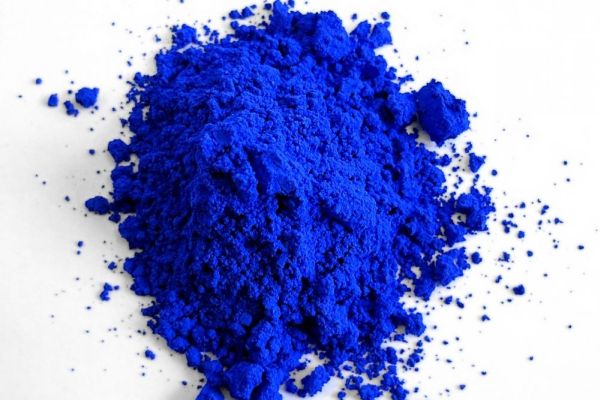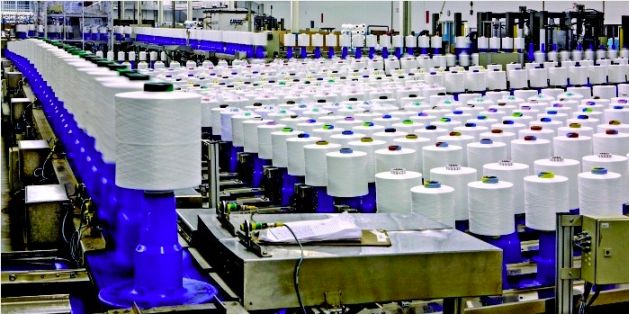Careers in Paints, Dyes, and Textiles
Paints and Dyes

YInMn Blue CREDIT: Oregon State University
About
Chemists are behind the colors you see in car finishes, hair, wood, food, textiles, and the list goes on. Paints are made by pigments which are insoluble materials that are mixed with binders which allow for them to attach to a substrate. They often come from minerals but can also by synthesized in laboratories. Pigments can also be used in inks, plastics, fabrics, cosmetics, and food. Dyes are coloring materials that are applied as a solution onto various items. These items can then be used for decorative, aesthetic, and artistic purposes. The trick behind mastering the science of synthetic colors is to find stable complexes that are resistant to heat and light. This is where research and development with chemists comes into play for this industry. Possible positions a chemist can take in this field include research, production, and management.
Education
The minimum required education for dye/pigment/ink chemists is a bachelor’s degree in Chemistry or a related scientific field. This field does not require any licenses for employment. Candidates should have a strong background in several Chemistry topics such as Organic Chemistry, Analytical Chemistry, and Materials Science.
If you are looking to pursue a graduate degree to work in this field, consider looking into Materials Science graduate programs. For a list of schools that offer Materials Science/Engineering graduate programs, visit this list compiled by USNEWS. For more information on applying to graduate programs please visit our page on Graduate Programs.
| Position | Education Needed |
|---|---|
| Research Assistant, Technician, Production Plant Chemist |
|
| Instrument Specialist, Chemical Engineer, Marketing, Customer Service |
|
| Managerial and Administration |
|
| Research and Academic |
|
Qualifications for Jobs
- Degree in Polymer, Organic, Chemical Engineering, or Materials Chemistry/Engineering with an emphasis in polymer or textile chemistry.
- Industrial experience in textile field, formulation, and/or product development (Minimum as high as 5 years of experience)
- Computer skills and data analysis
- Ability to learn quickly
- Knowledge and attention to detail of federal and local regulatory constraints
Keywords to Search for Positions in This Field
- Ink Chemist
- Chemist, Color Technology
- Postdoctoral Intern Research & Development Ink Chemist
- R&D Chemist
- Chemist I - Global Materials
- Chemist - Pigment Formulations
- Formulations Chemist
Featured Companies
These companies in the United States hire chemists that specialize in formulation of dyes, inks, pigments, and paints. Check out their websites to find out more about these companies and the positions they offer.
Average Salary
According to the American Chemical Society - Dyes, Pigments and Inks, the following table is the median salary for each position within the Synthetic Dye and Pigment Manufacturing field as of April 2015.
| Position | Median Salaries |
|---|---|
| Chemical Laboratory Technician | $36,000 |
| Marketing Manager | $45,000 |
| Chemists with bachelor’s degrees | $50,000 - $80,000 |
| Ink Chemists | $60,200 |
| Pigment Chemists | $65,400 |
| Laboratory Manager | $76,000 |
Employment Trends
According to the bureau of Labor Statistics, employment of materials scientists are expected to grow 7% from 2016 to 2026. However, those with a Ph.D. have a higher chance at employment. Specifically for material scientists specializing in pigments/paints, the global demand will slowly increase until 2020. Global demands call for the production of paints, varnishes, and plastic colorants. As for material scientists specializing in inks, most countries purchase ink within their territories which means that the demand for ink chemists might be lower than for those requesting pigment chemists. A potential market to look out for in the future is the Cosmetics industry; This fast growing industry utilizes dyes and pigments in the formulation of their products. For more information on this industry and formulation, look into our Personal Care page.
Textiles
 Spools of thread ready for shipment. CREDIT: Unifi
Spools of thread ready for shipment. CREDIT: Unifi
About
Textile chemistry is an applied field of chemistry in regards to textiles used in clothing, furniture, tire yarn, air bags, etc. This industry is closely related to the Paint and dye industry as they both specialize in materials science and go hand in hand together to make a division of textile chemistry that calls for dyeing and finishing textiles. The other divisions of textile chemistry are the fiber and polymer section and the blending of different textile materials. Most positions in this industry include research and development, product development, environmental testing, dyeing, technical services, and finishing operations.
Education
No specific textile degree is required. Job candidates are expected to take organic chemistry, analytical chemistry, polymer chemistry and colloid chemistry. Most potential job candidates have a strong background/are trained in polymer chemistry.
Qualifications for Jobs
- Understanding of structures, composition, and properties of substances (Polymer Chemistry)
- Mathematics and computer science skills
- Experience with analytical instrumentation techniques
- Critical thinking, problem solving, and analytical skills
- Minimum education required is a Bachelor’s of Science degree in Chemistry or Materials Science. Advanced degrees are preferred.
- 5+ years of experience in chemistry development, formulation or polymer chemistry
- Working knowledge of computer programs such as Microsoft Office, Photoshop, Adobe Illustrator, etc.
Keywords to Search for Positions in this Field
- Process Engineer - Textiles
- Material Scientist - Fabric
- Fabric and Material Innovation
- Textile Chemistry Research
Featured Companies
These companies in the United States hire chemical engineers that specialize in textile chemistry. Check out their websites to find out more about these companies and their positions they offer.
Average Salary
According to the American Chemical Society, the median annual wage for textile chemists as of 2015 is $97,360. Because most textile companies employ chemical engineers, it is also important to note that the median annual pay as of 2017 for chemical engineers is $102,160 based on data compiled from the Bureau of Labor Statistics.
Employment Trends
Textile chemistry positions are hard to come by in the United States since most dye companies have moved offshore. Because of this, there are more opportunities available in textile companies globally. There are very few U.S.-based dye companies left. However, with environmental problems arising in the dye and textile industry such as pollution, there is a demand for research and challenges to find a solution to these problems.
Credit: Richelle A. De Guzman











